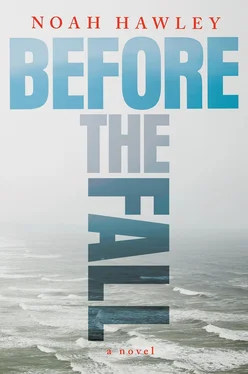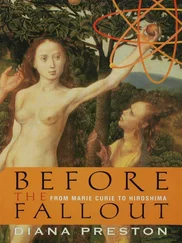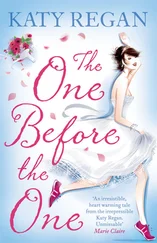After he was done reading the article, James tore it out of the magazine and carefully folded it into thirds. He flagged down a passing waiter and asked him to throw it in the trash. The danger in leaving the article inside the magazine was that his mother would pick it up in passing, see the article, and go off on one of her “tangents.” The last tangent took her down the rabbit hole of Scientology for nine years, during which time she accused James of being a suppressive person, and cut all contact, which he didn’t mind so much, except he worried. Darla surfaced again years later, chatty and warm, as if nothing had happened. When James asked her what had happened, she said simply, “Oh, those sillies. They act like they know everything. But as the Tao Te Ching tells us, Knowing others is wisdom. Knowing the self is enlightenment. ”
James watched the waiter disappear into the kitchen. He had the impulse to follow him and make sure the article was thrown away — in fact he wished he’d told the waiter to bury it under other refuse, or that he himself had torn it into small, unreadable pieces — but he resisted. These obsessive impulses were best ignored, a lesson he had learned the hard way. The article was gone. Out of sight. Unreachable. That was what mattered.
And just in time, for in rode his mother on her Ventura 4 Mobility Scooter with adjustable angle, delta tiller (bright red, of course). She rolled down the handicapped ramp, saw him, and waved. James stood as she approached, navigating past diners (who had to move their chairs so she could pass). It’s not that his mother was obese (in fact, just the opposite: She weighed no more than ninety pounds) or that she had a disability (she walked just fine). It’s that she liked the statement the fire-engine-red scooter made, the import it brought. This was clear from the entrance she’d just made, wherein everyone in the restaurant had to stand, and adjust their seats, as if for the entrance of a queen.
“Hi there,” said Darla as James held out a chair for her. She stood without effort and took it. Then, seeing his mimosa, “What are we drinking?”
“It’s a mimosa. Would you like one?”
“Yes, please,” she said.
He signaled to the waiter to bring another. His mother put her napkin in her lap.
“So? Tell me I look wonderful.”
James smiled.
“You do. You look great.”
There was a voice he used only with her. A slow and patient elucidation, as if speaking to a child with special needs. She liked it, as long as he didn’t go too big with it, pushing to the point of patronization.
“You seem fit,” she said. “I like the mustache.”
He touched it, realizing she hadn’t seen him with it.
“A little Errol Flynn, ay?” he said.
“It’s so gray, though,” she suggested with a wince. “Maybe a little boot black.”
“I think it makes me look distinguished,” he said lightly as the waiter brought her drink.
“You’re a darling,” she told him. “Have another ready, will you. I’m dreadfully thirsty.”
“Yes, ma’am,” he said, withdrawing.
Over the decades, his mother’s British accent had morphed into something James had taken to calling pure affectation. Like Julia Child, she had a grandness about her that made the accent seem simply aristocratic. As in, This is just the way we speak, darling .
“I researched the specials,” he said. “I’m told the frittata is divine.”
“Ooh good,” she said. There was nothing she loved more than a good meal. I’m a sensualist , she told people, which was something that sounded sexy and fun when she was twenty-five, but now — at seventy — just sounded wrong.
“Did you hear about the red heifer?” she asked after they ordered. He had a brief, panicked flash that somehow she had seen the article, but then he remembered that she watched CNN twenty-four hours a day. They must have done a story.
“I saw it,” he told her, “and I’m excited to hear your thoughts, but let’s talk about something else first.”
This seemed to placate her, which told him that she hadn’t connected to the story completely yet, the way a plug connects to a socket, drawing power.
“I’ve taken up the harmonica,” he said. “Trying to get in touch with my musical roots. Although I’m not sure roots is the right—”
She handed her empty glass to the waiter, who arrived with another just in time.
“Your stepfather played the harmonica,” she told him.
“Which one?”
She either didn’t hear his quip or ignored it.
“He was very musical. Maybe you got it from him.”
“I don’t think it works that way.”
“Well,” she said, and sipped her drink. “I always thought it was a little silly.”
“The harmonica?”
“No. Music. And God knows I had my share of musicians. I mean, the things I did to Mick Jagger would make a hooker blush.”
“Mother,” he said, looking around, but they were far enough from the other diners that no heads had turned.
“Oh please. Don’t be such a prude.”
“Well, I like it. The harmonica.”
He took it out of his jacket pocket, showed it to her.
“It’s portable, right? So I can take it anywhere. Sometimes I play quietly in the cockpit with the autopilot on.”
“Is that safe?”
“Of course it’s safe. Why wouldn’t it be—”
“All I know is I can’t keep my phone on for takeoff and landing.”
“That’s — they changed that. And also, are you suggesting the sound waves from the harmonica could impact the guidance system, or—”
“Well, now — that’s your area — technical understanding — I’m just calling it like I see it.”
He nodded. In three hours he was scheduled to take an OSPRY to Teterboro and pick up a new crew. Then a short jaunt to Martha’s Vineyard and back. He’d gotten a room reserved at the Soho House downtown, with a one-night layover, then tomorrow he flew to Taiwan.
His mother finished her second drink— they pour them so small, dear —and ordered a third. James noticed a red string on her right wrist— so she’s back on Kabbalah . He didn’t need to check his watch to know that it had only been fifteen minutes since she arrived.
When he told people he’d grown up in a doomsday cult he was only partially kidding. They were there — he and Darla — for five years, from ’70 to ’75, there being a six-acre compound in Northern California. The cult being The Restoration of God’s Commandments (later shortened to simply The Restoration), run by the right reverend Jay L. Baker. Jay L. used to say that he was the baker and they were his bread. God, of course, was the baker who’d made them all.
Jay L. was convinced the world would end on August 9, 1974. He had had a vision on a river rafting trip — family pets floating up to heaven. When he came home, he consulted the scriptures — the Old Testament, the Book of Revelation, the Gnostic Gospels. He became convinced there was a code in the Bible, a hidden message. And the more he dug, the more notes he took in the margins of religious texts, the more he banged out sums on his old desktop calculator, the more convinced he became that it was a date. The date.
The end of the world.
Darla met Jay L. on Haight Street. He had an old guitar and a school bus. His followers numbered exactly eleven (soon to grow to just under a hundred), mostly women. Jay L. was a handsome man (under all that hair), and he’d been blessed with an orator’s voice, deep and melodious. He liked to gather his followers in intertwining circles, like the symbol for the Olympics, so that some sat face-to-face, and he’d wander among them espousing his belief that when the rapture came only the purest souls would ascend. Purity in his eyes meant many things. It meant that one prayed at least eight hours a day, that one committed oneself to hard work and to caring for others. It meant that one ate no chicken or chicken-related products (such as eggs), that one bathed only with soaps made by hand (sometimes cleaning one’s face with the ash of a birch tree). Followers had to surround themselves with only pure sounds — sounds straight from the source, no recorded materials, television, radio, film.
Читать дальше












